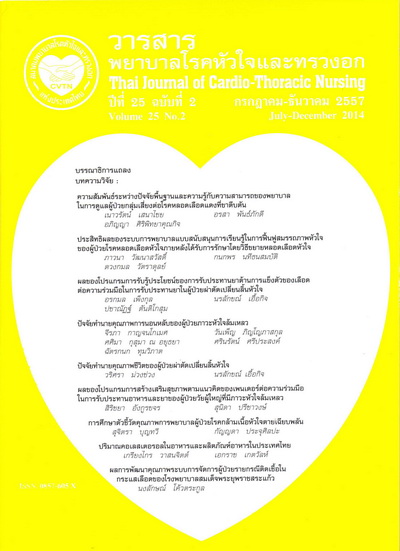ประสิทธิผลของระบบการพยาบาลแบบสนับสนุนการเรียนรู้ ในการฟื้นฟูสมรรถภาพหัวใจของผู้ป่วยโรคหลอดเลือดหัวใจ ภายหลังได้รับการรักษาโดยวิธีขยายหลอดเลือดหัวใจ
Keywords:
การพยาบาลแบบสนับสนุนการเรียนรู้, โรคหลอดเลือดหัวใจ, ความสามารถในการดูแลตนเอง, ความรู้สึกไม่แน่นอนในความเจ็บป่วย, คุณภาพชีวิต, ระดับไขมันในเลือด, Supportive-educative nursing system, Cardiac rehabilitation, Coronary heart disease, Self-CareAbstract
งานวิจัยกึ่งทดลองแบบกลุ่มเดียวนี้มีวัตถุประสงค์เพื่อทดสอบประสิทธิผลของการพยาบาลแบบสนับสนุนการเรียนรู้ในการฟื้นฟูสมรรถภาพหัวใจของผู้ป่วยหลังทำ Percutaneous coronary intervention (PCI) คัดเลือกกลุ่มตัวอย่างแบบเฉพาะเจาะจง เป็นผู้ป่วยหลังทำ PCI จำนวน 40 ราย ที่มาใช้บริการในหน่วยฟื้นฟูสมรรถภาพหัวใจ โรงพยาบาลภูมิพลอดุลยเดช กลุ่มตัวอย่างได้รับโปรแกรมการพยาบาลแบบสนับสนุนการเรียนรู้ในการฟื้นฟูสมรรถภาพหัวใจตั้งแต่ระยะที่ 1 ถึงระยะที่ 4 ประกอบด้วย: การใช้บทบาทของพยาบาลผู้เชี่ยวชาญทางคลินิก โรคหัวใจ คือ การให้ข้อมูลการดูแลตนเองโดยการสอน การดูแลโดยตรงในลักษณะของผู้จัดการรายกรณี การฝึก ทักษะ การเสริมพลังอำนาจ การอำนวยความสะดวก ประสานงานทีมสุขภาพ และสหสาขาวิชาชีพ พร้อมทั้งให้คำปรึกษา การฝึกการออกกำลังกาย และเฝ้าระวังภาวะฉุกเฉิน โดยติดตามอย่างต่อเนื่องเป็นระยะเวลานาน 12 สัปดาห์ เก็บข้อมูลโดยใช้แบบสอบถามความสามารถในการดูแลตนเอง แบบสอบถามวัดความรู้สึกไม่แน่นอนในความเจ็บป่วย แบบสอบถามคุณภาพชีวิต ส่วนผลลัพธ์ด้านสุขภาพวัดระดับไขมันในเลือด และระยะทางเดินบนพื้นราบในเวลา 6 นาที วิเคราะห์ข้อมูลโดยใช้สถิติบรรยาย และRepeated measure ANOVA
ผลการศึกษาพบว่า กลุ่มตัวอย่างมีความสามารถในการดูแลตนเองเพิ่มขึ้น และแตกต่างกันอย่างมีนัยสำคัญทางสถิติในทุกระยะของโปรแกรมพยาบาลแบบสนับสนุนการเรียนรู้ในการฟื้นฟูสมรรถภาพหัวใจ (p<0.001) มีความรู้สึกไม่แน่นอนในความเจ็บป่วยลดลง และแตกต่างกันอย่างมีนัยสำคัญทางสถิติในทุกระยะของโปรแกรม (p<0.001) และมีคุณภาพชีวิตเพิ่มขึ้น และแตกต่างกันอย่างมีนัยสำคัญทางสถิติในทุกระยะของโปรแกรม(p<0.001) ส่วนผลลัพธ์ด้านสุขภาพพบว่าในระยะที่ 1 กับระยะที่ 4 มีระดับไขมันโคเลสเตอรอลและระดับแอลดีแอล (LDL-C) ลดลงและแตกต่างกันอย่างมีนัยสำคัญทางสถิติ (p<0.01) ระดับเอชดีแอลเพิ่มขึ้นและแตกต่างกันอย่างมีนัย สำคัญทางสถิติที่ระดับ (P<0.05) ส่วนระดับไตรกลีเซอไรด์ไม่มีการเปลี่ยนแปลงอย่างมีนัยสำคัญทางสถิติ นอกจากนี้กลุ่มตัวอย่างมีระดับสมรรถภาพทางกายโดยวัดจากค่าเฉลี่ยของระยะทางเดินบนพื้นราบในเวลา 6 นาทีเพิ่มขึ้นและมีความแตกต่างกันอย่างมีนัยสำคัญทางสถิติ (p<0.001)
ผลการศึกษาครั้งนี้แสดงให้ประสิทธิผลของระบบการพยาบาลแบบสนับสนุนการเรียนรู้ในการฟื้นฟูสมรรถภาพหัวใจในผู้ป่วยหลังทำ PCI แสดงให้เห็นหลักฐานเชิงประจักษ์ในการใช้บทบาทของพยาบาลผู้เชี่ยวชาญทางคลินิกโรคหัวใจได้อย่างเหมาะสม และเพิ่มผลลัพธ์ทางด้านสุขภาพที่ดี ดังนั้นในสถานพยาบาลจึงควรมีพยาบาลผู้เชี่ยวชาญทางคลินิกทำหน้าที่ดูแลผู้ป่วยโรคหลอดเลือดหัวใจอย่างต่อเนื่อง
The Effects of a Supportive-Educative Nursing System on
Cardiac Rehabilitation among Coronary Artery Disease
Patients that Have Undergone Percutaneous Coronary Intervention
This quasi-experimental research was aimed to study the effects of a supportive-educative nursing system on the cardiac rehabilitation of patients that have undergone percutaneous coronary intervention (PCI). Forty patients with post PCI that had participated in the cardiac rehabilitation program at Bhumibol Adulyadej Hospital were the subjects. The supportive-educative nursing system was conducted from phase one to phase four of cardiac rehabilitation also included the following: the role of the cardiovascular clinical nurse specialist was to provide self-care through teaching, direct care supervision of the nurse case manager, skills training, empowerment, facilitation and co-ordination with a multidisciplinary team, counseling, training exercises and surveillance emergency including follow-up for 12 weeks. Data were collected using questionnaires of self-care capability, uncertainty in illness, and quality of life. Physical outcomes were measured using a lipid profile levels and functional capacity with a 6-minute walk test. The results were analyzed using descriptive statistics and Repeated measure ANOVA.
The results showed that the samples’ capabilities of self-care showed significant increases in all phases of the cardiac rehabilitation (p<0.001). The scores of uncertainty in illness was significantly decreased in all phases (p<0.001). They also demonstrated a significant increase in their quality of life scores in all phases (P<0.001). The physical outcome between phases 1 and 4 showed that the cholesterol level and LDL- cholesterol levels significantly decreased (p<.01), HDL-cholesterol levels increased significantly (p<.05). However, there were no significant changes in the triglyceride level. In addition, the functional capacity level which was measured using 6MWT, increased significantly (p<0.001). This study demonstrated the effects of a supportive-educative nursing system on the cardiac rehabilitation of patients undergone PCI. It also showed the evidence-based roles of a clinical nurse specialist in providing appropriate direct care to enhance health outcomes. Thus, healthcare institutions should allocate a cardiovascular clinical nurse specialist to provide continuing care for coronary heart disease patients.
Downloads
Published
How to Cite
Issue
Section
License
บทความนี้ยังไม่เคยตีพิมพ์หรืออยู่ในระหว่างส่งไปตีพิมพ์ในวารสารอื่น ๆ มาก่อน และกองบรรณาธิการขอสงวนสิทธิ์ในการตรวจทาน และแก้ไขต้นฉบับตามเกณฑ์ของวารสาร ในกรณีที่เรื่องของท่านได้ได้รับการตีพิมพ์ในวารสารฉบับนี้ถือว่าเป็น ลิขสิทธิ์ของวารสารพยาบาลโรคหัวใจและทรวงอก






